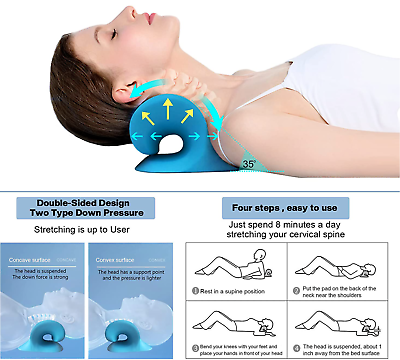Get Long Lasting Relief with the Neck Cloud: The Ultimate Neck Support
The Impact of Stress And Anxiety on Neck Pain: Approaches for Decreasing Stress and Discomfort
In today's busy world, it's clear that stress has come to be a prevalent consider the onset and exacerbation of neck discomfort. The intricate connection in between stress and muscle mass stress often leaves individuals looking for remedy for the discomfort that takes place. By discovering targeted strategies aimed at minimizing stress and promoting relaxation, one can start to resolve the root triggers of neck discomfort and job in the direction of a more balanced state of wellness. Join us on a trip to untangle the impact of tension on neck discomfort and discover effective methods to relieve discomfort and improve total quality of life.
Comprehending Stress-Related Neck Pain
Stress-related neck discomfort can show up as tension, stiffness, or discomfort in the neck and shoulder location. The connection between stress and anxiety and neck discomfort lies in the body's physical action to tension, which can result in muscle tension and rigidity in the neck muscles.

Identifying Common Tension Locations
Regularly experienced by individuals under anxiety, tension areas in the body can give important understandings into the physical indications of psychological stress. One usual tension location is the neck, where stress and anxiety typically materializes physically. Stress headaches, stiff neck muscular tissues, and limited series of activity prevail signs of stress-related neck stress. The shoulders are another common location where tension builds up. Anxiety can create the muscles in the shoulders to tighten, causing pain and pain. Additionally, the upper back is susceptible to tension build-up, particularly in people that experience persistent stress. Poor position and extended resting can aggravate stress around. The jaw is also a typical area for stress-related stress, as lots of people clench their jaw or grind their teeth when stressed. Knowing these common tension areas can help individuals acknowledge the physical indications of stress and anxiety and take steps to address them before they escalate right into persistent discomfort or pain.
Applying Leisure Methods
To efficiently manage stress-related stress in the body, applying relaxation techniques is critical. Leisure techniques are valuable devices for minimizing neck pain created by anxiety. Deep breathing exercises can aid soothe the mind and unwind tense muscles in the neck and shoulders (neck cloud). Exercising mindfulness meditation my response can also be beneficial in relieving anxiety and promoting leisure. Progressive muscular tissue relaxation, where you methodically stressful and afterwards relax various muscle teams, can release built-up stress in the neck location. Furthermore, tasks like yoga and tai chi include both physical motion and relaxation, making them reliable practices for lowering tension and neck discomfort. Taking regular breaks throughout the day to stretch and loosen up can prevent muscle mass rigidity and tension from gathering. By incorporating these relaxation strategies into your daily routine, you can aid manage anxiety degrees, decrease stress in the neck, and alleviate pain related to stress-induced neck pain.
Including Self-Care Practices
Incorporating self-care practices is important for keeping total well-being and managing stress-related neck discomfort properly. Participating in normal physical task, such as mild extending workouts or yoga, can assist minimize tension in the neck and shoulders. Practicing great position throughout the day and taking frequent breaks from prolonged sitting or display time can additionally prevent pressure on the neck muscular tissues.
In addition, focusing on appropriate rest and establishing a consistent sleep regimen can add dramatically to lowering stress and anxiety degrees and promoting relaxation. Creating a relaxing going to bed routine, such as reading a publication or taking a cozy bath, can help prepare the mind and body for relaxed rest. Additionally, maintaining a well balanced diet plan rich in nutrients and remaining moisturized can support total wellness and decrease inflammation that might worsen neck pain.
Including mindfulness methods, such as deep breathing exercises or reflection, can help manage stress and anxiety and promote leisure. Taking some time for oneself, taking part in leisure activities, and setting boundaries to safeguard individual time are also vital aspects of self-care that can contribute to reducing anxiety and minimizing neck discomfort.
Seeking Specialist Aid
Just how can people effectively attend to relentless neck discomfort that is affecting their everyday life and health? Looking for professional help can be a vital action in handling and reducing neck pain.
Chiropractics physician specialize in spinal control methods to boost alignment and reduce tension in the neck area. Physical therapists provide targeted stretches and workouts to enhance muscle mass, enhance versatility, and improve general neck feature. Orthopedic professionals can supply innovative clinical treatments such as injections or surgical options for severe cases of neck pain.
Conclusion

Stress-related neck pain can manifest as tension, stiffness, or discomfort in the neck and shoulder area. The connection between stress and neck pain lies in the body's physiological response to stress, which can result in muscle stress and rigidity in the neck muscular tissues. Stress migraines, rigid neck muscle mass, and restricted range of activity are usual signs and symptoms of stress-related neck stress. By integrating these relaxation methods into your day-to-day regimen, you can assist handle tension levels, lower stress in the neck, and ease discomfort associated with stress-induced neck pain.
